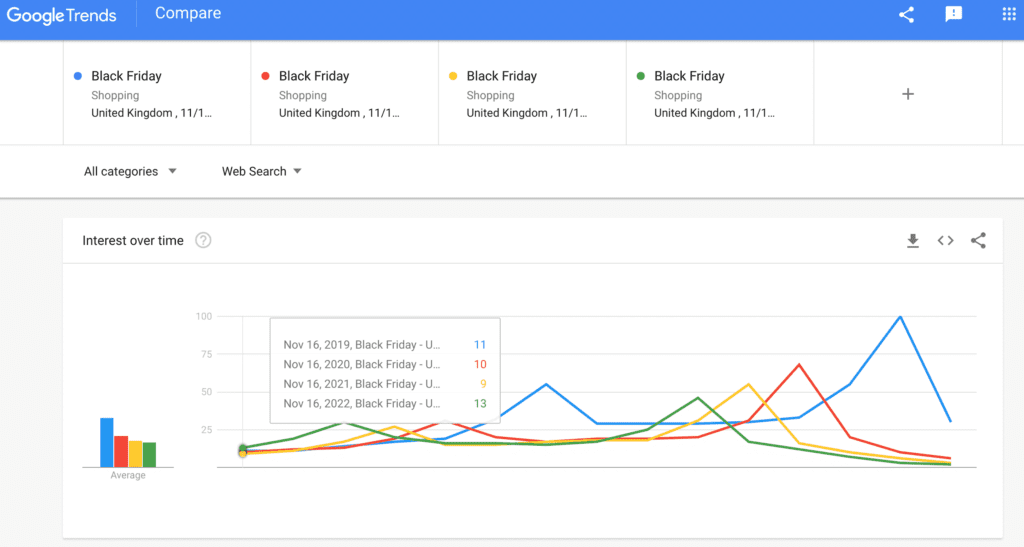Black Friday has grown to be one of the peak selling periods in the UK, competing with Boxing Day to be one of the highest revenue days of the year. The potential for return is incredibly high – as is the competition, which is why marketing teams devote months of planning and strategy to get the best results. In this article we take a closer look at Fake Friday and how marketers can adapt their Black Friday plans to take it into account.
What is Fake Friday?
Fake Friday is the Friday before the real Black Friday. Shoppers start to become more aware of the upcoming sales and are checking when it’s all kicking off. In fact, searches of ‘When is Black Friday?’ have peaked exactly a week before Black Friday for the past three years:
The term ‘Black Friday’ alone has enjoyed a surged in interest the last few years on Fake Friday. The figures below, from 2022, show that while performance may be low in search volume compared to previous years (green line), there are two interesting takeaways:
- The difference in traffic between Fake Friday and Black Friday 2022 was the lowest in four years
- 2022’s Fake Friday search level was second only to 2019 – pre-covid times, with less uncertainty than we face now

The impact of those retailers who have brought forward and extended their sales is being reflected here. Interest is now spread out over time, with the impact of the actual Black Friday softened. There are opportunities to be found the week before the big sales typically get underway.
But it isn’t just about people searching. Those people are buying. And while the Google Trends graphs could be read as interest in Black Friday waning, that doesn’t appear to be the reality. Our clients saw record-breaking sales, massive spikes in conversions and huge improvements year-on-year – read more about that in a previous Black Friday summary.
What does Fake Friday mean for your marketing?
The data suggests people in the UK are thinking about Black Friday at least a week in advance. Whether they’re double-checking when the big day is so they don’t miss out, or are browsing for early access deals.
This would explain why we’ve seen a lot of tactics shift to bring Black Friday earlier in the month – there’s appetite! In fact, many retailers are making November a month of sales.
So here’s what we’d suggest, particularly for next year, and upcoming sales periods:
Launch your sales early
If you’re not already, consider bringing your campaigns forward at least a week ahead of Black Friday to capture interest, and extending right through to Cyber Monday. If they don’t convert, you can then remarket to them throughout the period as shoppers research and browse the sales.
If it’s not realistic to extend your sale by that long, consider offering only your email subscribers or regular customers early access to deals. One of our clients ran an early VIP sale on Fake Friday and actually took more revenue then than on Black Friday!
Keep budget available for surge in demand
If Black Friday is typically a great sales period for you, consider increasing your budget to respond to demand and cover the longer period of interest.
In fact, with slightly more budget spread over a longer period, you could see great returns. That’s because you’ll have less riding on the day itself and fighting less competition – in theory, your cost-per-click should be lower over a longer period of time than if you hedged all your bets just on Black Friday.
Obligatory caveat: each business is different, but it’s definitely worth looking at your data to see how sales and ads perform the week before Black Friday.
Avoid testing in November
In fact, avoid testing and tinkering with campaigns too close to November in general. The last thing you need is to send any Smart Bidding into a new learning cycle, which could put you on the back foot. You need to be confident in your campaign setups well in advance of launching your sales to give you the very best chance of success for your budget.
You can see more best practices from this Black Friday and Christmas ads strategy writeup, as well as this blog with insights from Black Friday and what retailers can learn about campaign strategy.
Discuss your plans with your Performance team
Any change to an annual strategy needs to be discussed with those who look after your accounts. Our Paid Media Managers start planning Black Friday campaigns months ahead of time to observe audiences and train Smart Bidding strategies in recognising the right customers.
You’ll also need to have your product feeds in order, know which products are priorities, and start working up eye-catching creative – this is not stuff you should be leaving to the last minute!
So if you’re looking at extending sales, discuss it with the experts. Our team are well-placed to advise on where to start with running your sale differently, how it could impact your budget, and what will need to be done differently.
If you’d like to discuss your ecommerce search strategy with us, get in touch today. And if ‘Friday’ is starting to look less like a real word to you… same.



